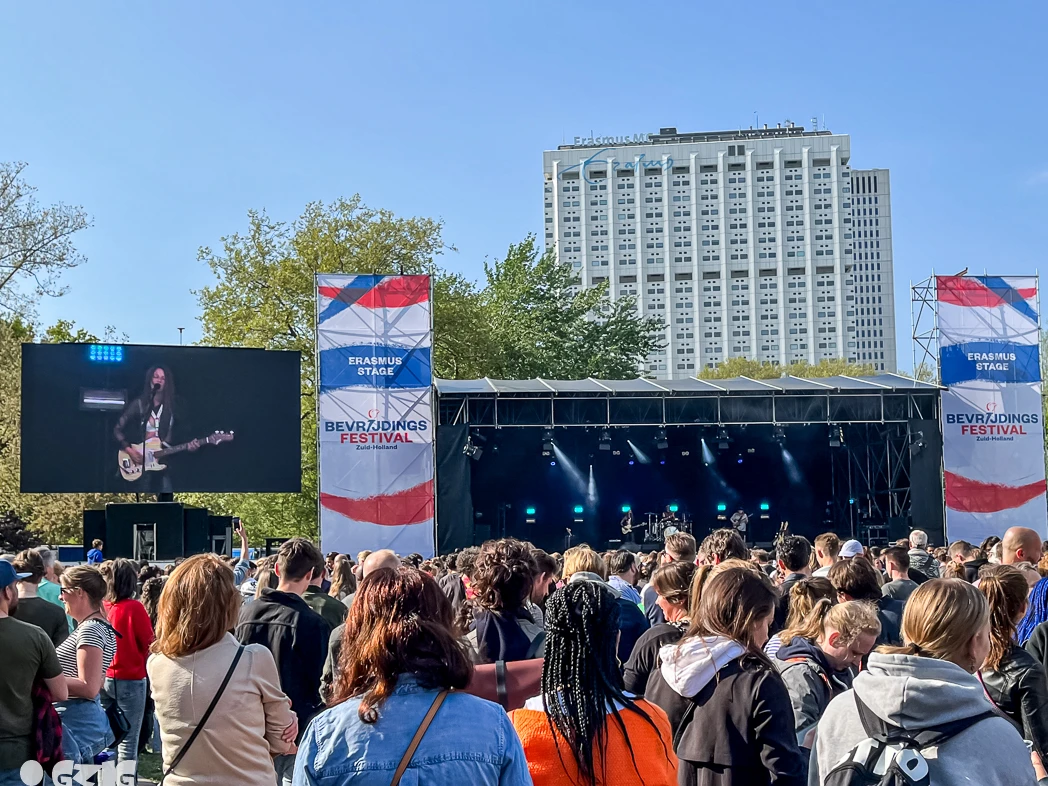
Celebrating freedom on Liberation Day
Share on social media:

5 May is Liberation Day in the Netherlands. On this day, the Netherlands celebrates the end of World War II in the Netherlands in 1945. And people remember that freedom cannot be taken for granted. In this article you will read how Dutch people celebrate Liberation Day.
Why is there Liberation Day on 5 May?
The Netherlands was occupied by Germany for 5 years during World War II. This was a very dramatic and tragic period in the history of the Netherlands. More than 100,000 Jews were rounded up and murdered. This also happened to other minority groups.
Thanks to the help of friendly countries, the German occupiers signed an agreement on 5 May 1945, thus liberating the Netherlands. This ended the German occupation of the Netherlands. From then on, the Netherlands has celebrated Liberation Day every year on 5 May.
Many Dutch people hang the Dutch flag outside on 5 May. The Dutch flag symbolises the Netherlands' freedom and independence. That is why the flag is always hung up at important national moments.
Eating together during 'Vrijheidsmaaltijden' (freedom meals)
There are also lectures, exhibitions and educational activities to reflect on freedom and democracy. On Liberation Day, 'Vrijheidsmaaltijden' (freedom meals) are cooked. People come together to eat and talk about freedom, democracy and human rights.
'Vrijheidsmaaltijden' (freedom meals) can be found in various places, such as community centres and schools. Everyone can participate. You can also organise a freedom meal yourself.
'Nationaal Comité 4 en 5 mei'
In major cities, you can go to Liberation Festivals
The Liberation Festivals with music, dance and other cultural activities have been a household name in the Netherlands for more than 30 years. Every year on 5 May, 14 Liberation Festivals are organised: in each province, in the capital Amsterdam and in The Hague, the city where the king lives.
Every year there are Dutch musical "Ambassadeurs van de Vrijheid" (Ambassadors of Freedom) who perform in several cities In 2025 they are: Antoon, RONDÉ, S10 and Zoë Tauran. They will fly through the Netherlands on 5 May 2025 as Ambassadors of Freedom to perform at the Liberation Festivals. Together with visitors to the festivals, they will reflect on the meaning of freedom.
Admission to Liberation Festivals is free. Food and drinks at these festivals can usually only be paid for by debit card. Often you are not allowed to bring your own food and drink to the festival grounds.
Find Liberation Festivals here
Liberation Festivals take place all over the Netherlands. In the 14 cities below you will find the biggest ones:
Noord-Holland
Cultuurpark Westergasfabriek
12:00 - 23:00
Free of charge
Museumplein
12:00 - 22:30
Haarlemmerhout
12:00 - 00:00
Free of charge
Zuid-Holland
Malieveld
12:00 - 23:00
Free of charge
The Park (at the foot of the Euromast)
12:30 - 23:00
Free of charge
Utrecht
Park Transwijk
12:30 to 23:00
Free of charge
Groningen
De Drafbaan
12:00 - 23:00
Free of charge
Flevoland
Almere city centre (Grote Markt and Esplanade)
13:00 - 23:00
Free of charge
Zeeland
Vlissingen city centre (Centrum & Machinefabriek)
12:00 - 00:00
Free of charge
Noord-Brabant
Pettelaarse Schans
12:00 - 23:00
Free of charge
Gelderland
Wageningen city centre
12:00 - 00:00
Free of charge
Overijssel
Park de Wezenlanden
11:00 - 23:30
Free of charge
Limburg
ARLO site on the banks of the Meuse River
12:00 - 00:00
Free of charge
Drenthe
Festival site: Baggelhuizen recreational area
11:30 - 00:00
Free of charge
Friesland
Leeuwarden city centre
13:00 - 23:00
Free of charge